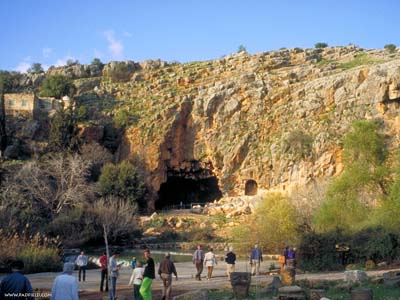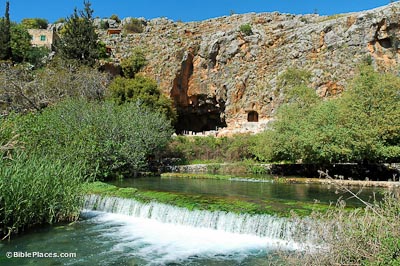TRUTH COMES BY REVELATION FROM GOD
Mat 16:13 When He arrived in the neighbourhood of Caesarea Philippi, Jesus questioned His disciples. "Who do people say that the Son of Man is?" He asked.
Mat 16:14 "Some say John the Baptist," they replied; "others Elijah; others Jeremiah or one of the Prophets."
Mat 16:15 "But you, who do you say that I am?" He asked again.
Mat 16:16 "You," replied Simon Peter, "are the Christ, the Son of the ever-living God."
Mat 16:17 "Blessed are you, Simon Bar-jonah," said Jesus; "for mere human nature has not revealed this to you, but my Father in Heaven.
Mat 16:18 And I declare to you that you are Peter, and that upon this Rock I will build my Church, and the might of Hades shall not triumph over it.
Mat 16:19 I will give you the keys of the Kingdom of the Heavens; and whatever you bind on earth shall remain bound in Heaven, and whatever you loose on earth shall remain loosed in Heaven."
Mat 16:20 Then He urged His disciples to tell no one that He was the Christ.
Mat 16:21 From this time Jesus began to explain to His disciples that He must go to Jerusalem, and suffer much cruelty from the Elders and the High Priests and the Scribes, and be put to death, and on the third day be raised to life again.
Mat 16:22 Then Peter took Him aside and began taking Him to task. "Master," he said, "God forbid; this will not be your lot."
Mat 16:23 But He turned and said to Peter, "Get behind me, Adversary; you are a hindrance to me, because your thoughts are not God's thoughts, but men's."
Mat 16:24 Then Jesus said to His disciples, "If any one desires to follow me, let him renounce self and take up his cross, and so be my follower.
Mat 16:25 For whoever desires to save his life shall lose it, and whoever loses his life for my sake shall find it.
Mat 16:26 Why, what benefit will it be to a man if he gains the whole world but forfeits his life? Or what shall a man give to buy back his life?
Mat 16:27 For the Son of Man is soon to come in the glory of the Father with His angels, and then will He requite every man according to his actions.
Mat 16:28 I solemnly tell you that some of those who are standing here will certainly not taste death till they have seen the Son of Man coming in His Kingdom."
Introduction.
The Disciples only vaguely understood who Jesus was and His Mission. The Story unfolds that they are learning slowly more and more about Who he was and what He came to do.
“Matthew shows that their knowledge was given content because of Peter's Misunderstanding and then because of the Vision we know as the Transfiguration. L.Morris P. 418
They were in gentile country with no crowds coming for teaching and for healing. Jesus clarified their thoughts about His person and then to teach them some important truths about Messiahship and Discipleship.
THE GATES OF HELL
Mat 16:13 When He arrived in the neighbourhood of Caesarea Philippi,Jesus questioned His disciples. "Who do people say that the Son of Man is?" He asked.
Notes
Caesarea Philippi or Caesarea Paneas was an ancient Roman city located at the southwestern base of Mount Hermon, adjacent to a spring, grotto, and related shrines dedicated to the Greek god Pan,
This city was situated about 40 kms to the North of the Sea of Galilee at the foot of Mt Hermon.
 |
| Mt. Hermon from Golan Heights |
"Who do people say that the Son of Man is?" He asked.
Son of Man was Jesus favourite designation of Himself. here he is not looking for an exposition of Daniel 7: 13 I saw in the night visions, and behold, One like the Son of Man came with the clouds of heaven, and came to the Ancient of Days, and they brought Him near before Him.
Jesus is asking them who the People thought He was.
Mat 16:14 "Some say John the Baptist," they replied; "others Elijah; others Jeremiah or one of the Prophets."
Notes
They presented differing views…...Herod in 14::2 thought that Jesus was John the Baptist risen from the dead.
"others Elijah; others Jeremiah or one of the Prophets."
The second group thought that Elias [Elijah] was more likely. They thought that Jesus fulfilled the prophecy of Malachi 4:5
Mal 4:5 Behold, I am sending you Elijah the prophet before the coming of the great and dreadful day of Jehovah.
Some thought that Jesus was Jeremiah all over again.
https://upload.wikimedia.org/wikipedia/commons/thumb/1/1e/Jeremiah_by_Repin.jpg/481px-Jeremiah_by_Repin.jpg
Mat 16:15 "But you, who do you say that I am?" He asked again.
Notes
But you,... But is an adversative conjunction showing the contrast with the others,, and you is emphatic. You, yes YOU! Jesus wants to know what his closest disciples said about Him. They had left all and were following Him. They had been with Him now quite some time and had opportunity to ascertain who He was. They had seen what He did and what He taught. In the light of all that had happened, HOW DID THEY VIEW HIM?
Mat 16:16 "You," replied Simon Peter, "are the Christ, the Son of the ever-living God."
Notes
Simon Peter spoke up for the Evangelistic band.
"You," replied Simon Peter, "are the Christ, the Son of the ever-living God."
Peter is the spokesman for the Twelve Disciples
‘’You are the Christ [Messiah]”. meaning You are the Chosen and anointed King.
Christ [Greek Messiah from the Hebrew HaMachiah spoke of His anointing . he was the chosen One of God to be the Ruler and King of Israel
Notes
Thou art the Christ, the Son of the living God - Every word here is emphatic - a most concise, and yet comprehensive, confession of faith.
The Christ, or Messiah, points out his divinity, and shows his office; the Son - designates his person: on this account it is that both are joined together so frequently in the new covenant. Of the living God Του Θεου, του ζωντος, literally, of God the Living One. The C. Bezae has for Του ζωντος the Living One, Του σωζοντος, the Savior, and the Cant. Dei Salvatoris, of God the Savior.
Living - a character applied to the Supreme Being, not only to distinguish him from the dead idols of paganism, but also to point him out as the source of life, present, spiritual, and eternal. Probably there is an allusion here to the great name יהוה Yeve, or Yehovah, which properly signifies being or existence.
Mat 16:17 "Blessed are you, Simon Bar-jonah," said Jesus; "for mere human nature has not revealed this to you, but my Father in Heaven.
Notes
The Truth of God come by Revelation by God Himself.
"Blessed are you, Simon Bar-jonah,
blessed makarios mak-ar'-ee-os Strong’s Definition
A prolonged form of the poetical μάκαρ makar (meaning the same); supremely blest; by extension fortunate, well off: - blessed, happy (X -ier).
Holy Joy and Religious delight accompanies those who receive the Revelation of Who Jesus is and What He can do.
"for mere human nature has not revealed this to you, but my Father in Heaven. “
Flesh and blood means Human nature has not revealed this to you.
Received by Divine revelaltion.
Mat 11:25 About that time Jesus exclaimed, "I heartily praise Thee, Father, Lord of Heaven and of earth, that Thou hast hidden these things from sages and men of discernment, and hast unveiled them to babes.
Mat 11:26 Yes, Father, for such has been Thy gracious will.
Mat 11:27 "All things have been handed over to me by my Father, and no one fully knows the Son except the Father, nor does any one fully know the Father except the Son and all to whom the Son chooses to reveal Him.
Mat 11:28 "Come to me, all you toiling and burdened ones, and *I* will give you rest.
Note the Intimacy in this expression “revealed by My Father in Heaven”.
The Father is the Source of all True Revelation.
Mat 16:18 And I declare to you that you are Peter, and that upon this Rock I will build my Church, and the might of Hades shall not triumph over it.
Notes
And I say also unto thee, That thou art Peter - The word “Peter,” in Greek, means “a rock.” It was given to Simon by Christ when he called him to be a disciple, Joh_1:42
Cephas is a Syriac word, meaning the same as Peter - a rock, or stone. The meaning of this phrase may be thus expressed: “Thou, in saying that I am the Son of God, hast called me by a name expressive of my true character. I, also, have given to thee a name expressive of your character. I have called you Peter, a rock, denoting firmness, solidity, stability, and your confession has shown that the name is appropriate. I see that you are worthy of the name, and will be a distinguished support of my religion.”
And upon this rock ... - This passage has given rise to many different interpretations. Some have supposed that the word “rock” refers to Peter’s confession, and that Jesus meant to say, upon this rock, this truth that thou hast confessed, that I am the Messiah and upon confessions of this from all believers, I will build my church. Confessions like this shall be the test of piety, and in such confessions shall my church stand amid the flames of persecution, the fury of the gates of hell. Others have thought that Jesus referred to himself. Christ is called a rock, Isa_28:16; 1Pe_2:8. And it has been thought that he turned from Peter to himself, and said, “Upon this rock, this truth that I am the Messiah - upon myself as the Messiah, I will build my church.” Both these interpretations, though plausible, seem forced upon the passage to avoid the main difficulty in it. Another interpretation is, that the word “rock” refers to Peter himself.
This is the obvious meaning of the passage; and had it not been that the Church of Rome has abused it, and applied it to what was never intended, no other interpretation would have been sought for. “Thou art a rock. Thou hast shown thyself firm, and suitable for the work of laying the foundation of the church. Upon thee will I build it. Thou shalt be highly honored; thou shalt be first in making known the gospel to both Jews and Gentiles.” This was accomplished. See Acts 2:14-36, where he first preached to the Jews, and Acts 10, where he preached the gospel to Cornelius and his neighbors, who were Gentiles. Peter had thus the honor of laying the foundation of the church among the Jews and Gentiles; and this is the plain meaning of this passage. See also Gal_2:9. But Christ did not mean, as the Roman Catholics say he did, to exalt Peter to supreme authority above all the other apostles, or to say that he was the only one upon whom he would rear his church. See Acts 15, where the advice of James, and not that of Peter, was followed. See also Gal_2:11, where Paul withstood Peter to his face, because he was to be blamed - a thing which could not have happened if Christ (as the Roman Catholics say) meant that Peter was absolute and infallible. More than all, it is not said here, or anywhere else in the Bible, that Peter would have infallible successors who would be the vicegerents of Christ and the head of the church. The whole meaning of the passage is this: “I will make you the honored instrument of making known my gospel first to Jews and Gentiles, and I will make you a firm and distinguished preacher in building my church.”
Will build my church - This refers to the custom of building in Judea upon a rock or other very firm foundation. See the notes at Mat_7:24. The word “church” literally means “those called out,” and often means an assembly or congregation. See Act_19:32, Greek; Act_7:38. It is applied to Christians as being “called out” from the world. It means sometimes the whole body of believers, Eph_1:22; 1Co_10:32. This is its meaning in this place. It means, also, a particular society of believers worshipping in one place, Act_8:1; Act_9:31; 1Co_1:2, etc.; sometimes, also, a society in a single house, as Rom_16:5. In common language it means the church visible - i. e., all who profess religion; or invisible, i. e., all who are real Christians, professors or not.
And the gates of hell ... - Ancient cities were surrounded by walls. In the gates by which they were entered were the principal places for holding courts, transacting business, and deliberating on public matters. See the notes at Mat_7:13. Compare the notes at Job_29:7. See also Deu_22:4; 1Sa_4:18; Jer_36:10; Gen_19:1; Psa_69:12; Psa_9:14; Pro_1:21. The word “gates,” therefore, is used for counsels, designs, machinations, evil purposes.
“Hell” means, here, the place of departed spirits, particularly evil spirits; and the meaning of the passage is, that all the plots, stratagems, and machinations of the enemies of the church would not be able to overcome it a promise that has been remarkably fulfilled.
Notes
At Caesurea Philippi the Grotto was called the Gates of hell because murdered people were thrown in there and their blood flowed out of the Grotto down the Hill. Caesurea Philippi now called Banias from the godess pan
Caesurea Philippi now called Banias from the godess pan
Mat 16:19 I will give you the keys of the Kingdom of the Heavens; and whatever you bind on earth shall remain bound in Heaven, and whatever you loose on earth shall remain loosed in Heaven."
Notes
The Keys of the kingdom (tas kleidas tēs basileias). Here again we have the figure of a building with keys to open from the outside. The question is raised at once if Jesus does not here mean the same thing by “kingdom” that he did by “church” in Mat_16:18. In Rev_1:18; Rev_3:7 Christ the Risen Lord has “the keys of death and of Hades.” He has also “the keys of the kingdom of heaven” which he here hands over to Peter as “gatekeeper” or “steward” (oikonomos) provided we do not understand it as a special and peculiar prerogative belonging to Peter. The same power here given to Peter belongs to every disciple of Jesus in all the ages. Advocates of papal supremacy insist on the primacy of Peter here and the power of Peter to pass on this supposed sovereignty to others. But this is all quite beside the mark. We shall soon see the disciples actually disputing again (Mat_18:1) as to which of them is the greatest in the kingdom of heaven as they will again (Mat_20:21) and even on the night before Christ’s death. Clearly neither Peter nor the rest understood Jesus to say here that Peter was to have supreme authority. What is added shows that Peter held the keys precisely as every preacher and teacher does. To “bind” (dēsēis) in rabbinical language is to forbid, to “loose” (lusēis) is to permit. Peter would be like a rabbi who passes on many points. Rabbis of the school of Hillel “loosed” many things that the school of Schammai “bound.” The teaching of Jesus is the standard for Peter and for all preachers of Christ. Note the future perfect indicative (estai dedemenon, estai lelumenon), a state of completion. All this assumes, of course, that Peter’s use of the keys will be in accord with the teaching and mind of Christ. The binding and loosing is repeated by Jesus to all the disciples (Mat_18:18). Later after the Resurrection Christ will use this same language to all the disciples (Joh_20:23), showing that it was not a special prerogative of Peter. He is simply first among equals, primus inter pares, because on this occasion he was spokesman for the faith of all. It is a violent leap in logic to claim power to forgive sins, to pronounce absolution, by reason of the technical rabbinical language that Jesus employed about binding and loosing. Every preacher uses the keys of the kingdom when he proclaims the terms of salvation in Christ. The proclamation of these terms when accepted by faith in Christ has the sanction and approval of God the Father. The more personal we make these great words the nearer we come to the mind of Christ. The more ecclesiastical we make them the further we drift away from him.
Mat 16:20 Then He urged His disciples to tell no one that He was the Christ.


No comments:
Post a Comment